

Supernatural Fiction. Supernatural fiction (properly, "supernaturalist fiction"[1]) is a literary genre exploiting or requiring as plot devices or themes some contradictions of the commonplace natural world and materialist assumptions about it.
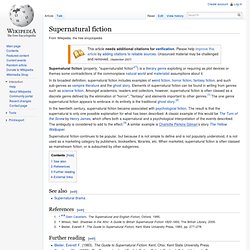
In its broadest definition, supernatural fiction includes examples of weird fiction, horror fiction, fantasy fiction, and such sub-genres as vampire literature and the ghost story. Elements of supernatural fiction can be found in writing from genres such as science fiction. Amongst academics, readers and collectors, however, supernatural fiction is often classed as a discrete genre defined by the elimination of "horror", "fantasy" and elements important to other genres.[1] The one genre supernatural fiction appears to embrace in its entirety is the traditional ghost story.[2] In the twentieth century, supernatural fiction became associated with psychological fiction.
J.K.Rowling - Harry Potter and more. Hpotterfacts.tumblr.com. List of spells in Harry Potter. List of Harry Potter characters. Why The Harry Potter Universe Is Secretly Terrifying. 50 Things I Am Not Allowed To Do At Hogwarts - StumbleUpon. Neil Gaiman. Judy Blume on the Web. Tintin.com. Artemis Fowl. Artemis Fowl - Eoin Colfer. This site uses some unobtrusive cookies to store information on your computer.
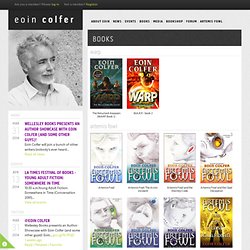
Some cookies on this site are essential, and the site won't work as expected without them. These cookies are set when you submit a form, login or interact with the site by doing something that goes beyond clicking on simple links. We also use some non-essential cookies to anonymously track visitors or enhance your experience of the site. If you're not happy with this, we won't set these cookies but some nice features of the site may be unavailable.Some cookies on this site are essential, and the site won't work as expected without them.
These cookies are set when you submit a form, login or interact with the site by doing something that goes beyond clicking on simple links. We also use some non-essential cookies to anonymously track visitors or enhance your experience of the site. To control third party cookies, you can also adjust your browser settings. (One cookie will be set to store your preference) Eoin Colfer. Georgia Nicolson. Roald Dahl - The Official Web Site. Lemony Snicket. R.L. Stine. Skulduggery Pleasant. Philip Pullman. His Dark Materials. His Dark Materials - Philip Pullman. The Amber Spyglass. The Amber Spyglass is the third and final novel in the His Dark Materials series, written by English author Philip Pullman, and published in 2000.
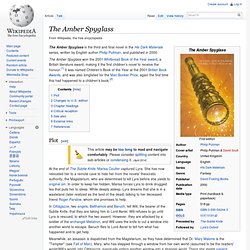
The Amber Spyglass won the 2001 Whitbread Book of the Year award, a British literature award, making it the first children's novel to receive the honour.[1] It was named Children's Book of the Year at the 2001 British Book Awards, and was also longlisted for the Man Booker Prize, again the first time this had happened to a children's book.[2] Plot[edit] At the end of The Subtle Knife, Marisa Coulter captured Lyra. She has now relocated her to a remote cave to hide her from the novels' theocratic authority, the Magisterium, who are determined to kill Lyra before she yields to original sin.
In order to keep her hidden, Marisa forces Lyra to drink drugged tea that puts her to sleep. In Cittàgazze, two angels, Balthamos and Baruch, tell Will, the bearer of the Subtle Knife, that they are taking him to Lord Asriel. Lyra returns to Jordan College. The Subtle Knife. Plot summary[edit] Lyra revisits Dr.
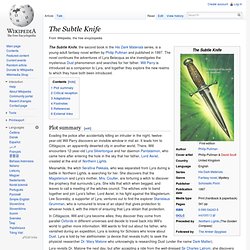
Malone the next day, but after accepting a ride from the well-dressed Sir Charles Latrom, she discovers that Sir Charles has stolen her alethiometer and she asks Will to help her retrieve it. When Lyra and Will confront Sir Charles, he readily admits that he has stolen the alethiometer and blackmails the pair into retrieving a mysterious knife from Cittàgazze in exchange for its return. They defeat the youth who holds the knife but Will receives a distinctive wound – the loss of two fingers – which the knife's true guardian explains as the sign that he is now the next true guardian of the Subtle Knife, a tool that cuts windows between worlds and cuts easily through anything – both material and spiritual. He explains further that this world is haunted by soul-eating Spectres, which prey on older children and adults but are invisible to children of their age, and that the knife must not fall into Sir Charles' hands. Mrs.
Critical reception[edit] Northern Lights (novel) Nineteen Eighty-Four. History and title[edit] A 1947 draft manuscript of the first page of Nineteen Eighty-Four, showing the editorial development.
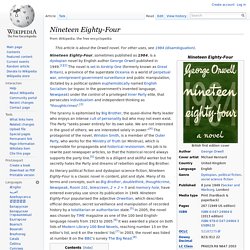
The Last Man in Europe was an early title for the novel but in a letter dated 22 October 1948 to his publisher Fredric Warburg, eight months before publication, Orwell wrote about hesitating between The Last Man in Europe and Nineteen Eighty-Four.[14] Warburg suggested changing the main title to a more commercial one.[15] Copyright status[edit]